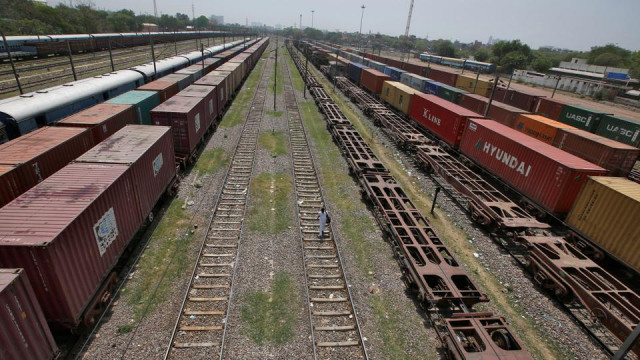Balochistan govt puts Quetta Mass Transit project on hold
Decision taken on basis of a pre-feasibility study that found scheme financially unviable

Representational image of railway tracks. PHOTO: REUTERS
According to government sources, Pakistan had conveyed to China about its decision regarding the Quetta Mass Transit scheme during a meeting of the Joint Working Group (JWG) on transport infrastructure of CPEC which was held this month.
Sources added that the provincial government took the decision to put the project on hold on the basis of a pre-feasibility study that found the mass transit scheme financially unviable.
Balochistan government was reviewing the mass transit option and considering both rail and bus routes, according to the discussions that took place in the JWG meeting.
Head of Pakistani delegation and Communication Secretary Jawwad Rafique had proposed that the project may be stalled and be considered after completing the feasibility study, design and the PC-I, according to the record of the meeting.
In November 2017, Pakistan and China had agreed to launch mass transit projects in Quetta, Peshawar and Karachi after the provincial governments had complained about starting the mass transit scheme in Punjab alone – the Orange Line Metro Project Lahore.
Since the Pakistan Tehreek-e-Insaf (PTI) government came to power, the Orange Line Metro Train project also faced delays. Sources said the Chinese contractors complained about the non-resolution of issues that were affecting operationalisation of the project.
The Chinese contractors highlighted the problems due to which the completion of Orange Line Metro Project Lahore was delayed. The outstanding issues include the remaining civil work on the project, municipal interface, provision of operation and maintenance team and security arrangements.
The head of Chinese delegation pointed out that any further delay in operations could cause problems.
The status of all ongoing CPEC projects would be discussed during the Joint Cooperation Committee (JCC) meeting that would be held from November 5-6 in Islamabad.
The JCC is the highest decision-making body of the CPEC that takes decisions about including and excluding any project from the CPEC framework.
Although the JCC had decided in 2017 to bring the provincial mass transit projects in the CPEC fold, the limited financing and human resources would make it difficult to simultaneously start work on all provincial projects.
Due to these constraints, "both sides agreed to move forward the three mass transit projects based on the principles of mature one, advance one," according to the official documents.
This means the work on any new mass transit project would only begin after the completion of the ongoing scheme – the Orange Line.
Sources said that the next project which was considerably mature for CPEC financing was the Karachi Circular Railway (KCR).
The relevant Pakistani forums have already cleared the KCR at an estimated cost of $1.97 billion.
The representative of the Sindh government had briefed about the latest progress of KCR in the JWG meeting.
The Chinese side informed that they had not received any formal financing request from Pakistan which was required to approve loan for the project.
The federal government directed the provincial government to submit the financing request to the Centre for onwards submission to the Chinese authorities.
Pakistan desired to complete the KCR by September 2020 but it could not fulfill the procedural requirements and the financing for the project was also not secured.
Like the much-delayed Peshawar Metro Bus project, the provincial government has also not been able to make headway on the Peshawar Mass Transit project of the CPEC.
Despite the lapse of two years, Khyber Pakhtunkhwa (KP) government has not been able to secure the requisite approvals from the competent authorities.
The JWG directed KP government to get the mass transit project approved from the competent forum after which it would be taken up in the next meeting which is expected to meet next year.
The representative of the KP government briefed the JWG about the main features and current status of the project. It was apprised that the project would be taken up in two phases.
It was informed that a memorandum of understanding for feasibility study had been reached between the transport department of the government of KP and China Railway Construction Corporation.
The feasibility study and design is in process.



















COMMENTS
Comments are moderated and generally will be posted if they are on-topic and not abusive.
For more information, please see our Comments FAQ